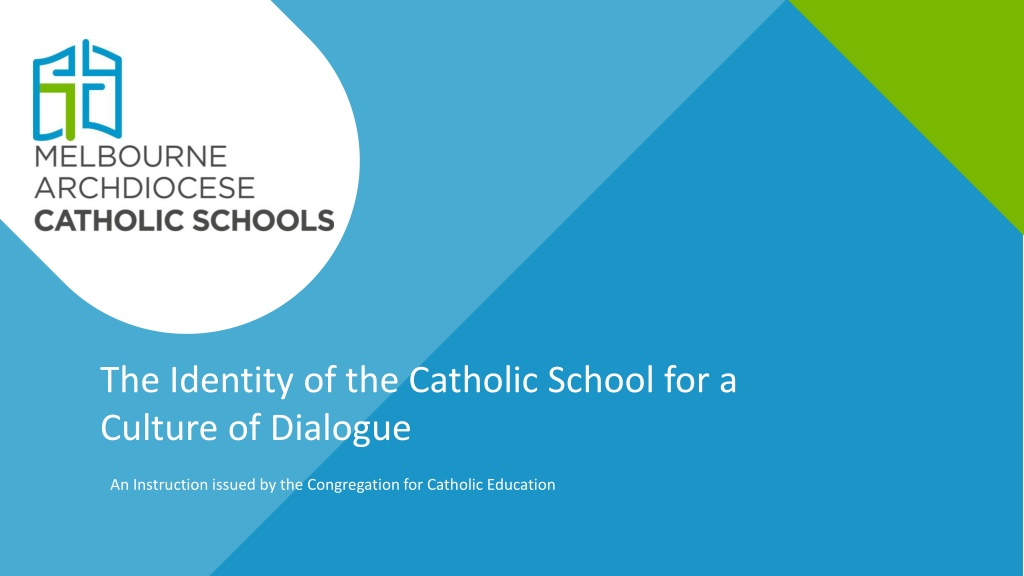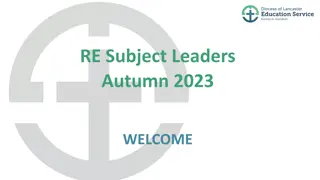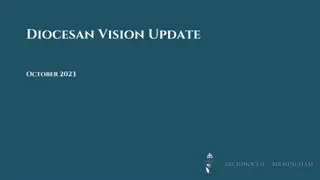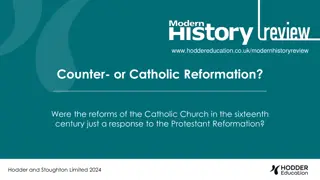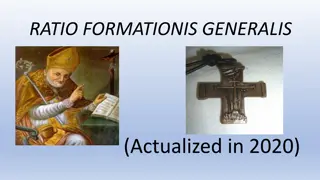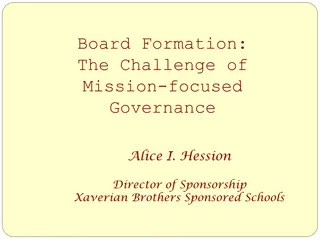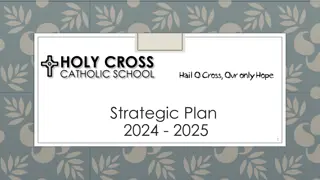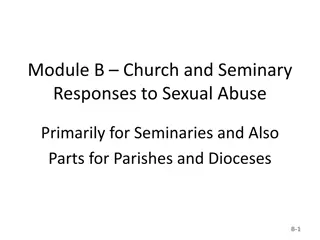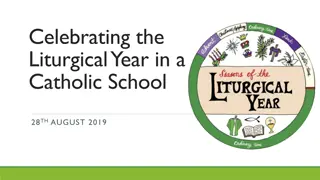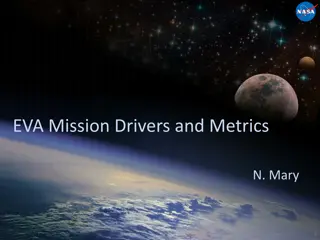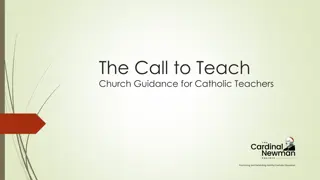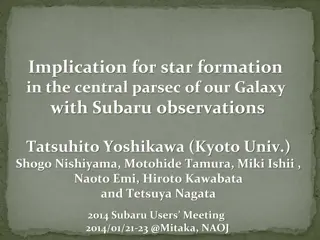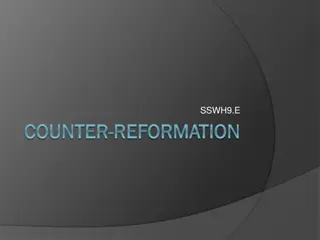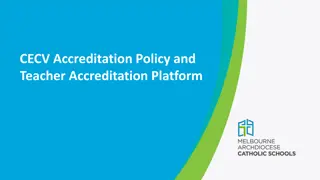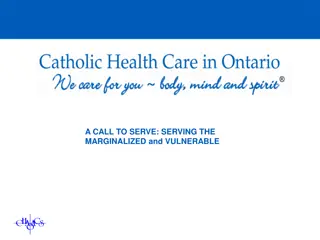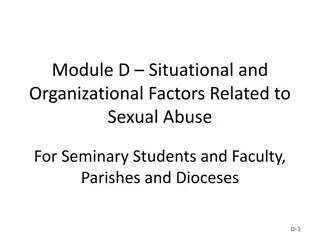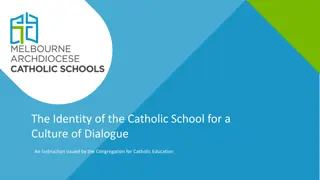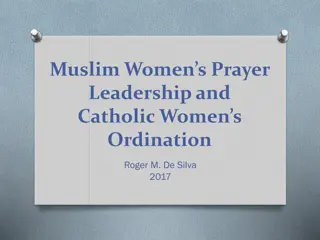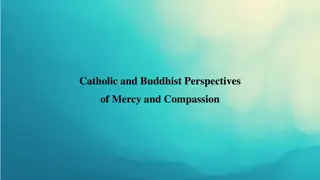Formation for Mission in Catholic Education
The document discusses the importance of formation for mission in Catholic education, emphasizing the systematic, collaborative, and ongoing process that aims to develop the heart, foster communal identity, and build a culture of dialogue rooted in Christian values. Key principles such as prayerfulness, reflection, and respect form the foundation of this formation, which aims to instill a strong connection with the Catholic tradition and a commitment to serving the evangelizing mission of Catholic school education.
Download Presentation

Please find below an Image/Link to download the presentation.
The content on the website is provided AS IS for your information and personal use only. It may not be sold, licensed, or shared on other websites without obtaining consent from the author. Download presentation by click this link. If you encounter any issues during the download, it is possible that the publisher has removed the file from their server.
E N D
Presentation Transcript
The Identity of the Catholic School for a Culture of Dialogue An Instruction issued by the Congregation for Catholic Education
Acknowledgment of Country We acknowledge that James Goold House, the MACS regional offices and Catholic schools in the Archdiocese of Melbourne are situated on the lands of the five language groups that make up the Kulin Nations, who have walked upon and cared for this land for thousands of years. We acknowledge their continued deep spiritual connection and relationship to Country. We pay respects to their Elders past, present and future, and commit to the ongoing journey of reconciliation. Chelsea Sporle St Anne's School, Sunbury, Year 4
ICS Chapter III: Some critical aspects Formation for mission is a process that is systematic, collaborative, graduated and ongoing.
Key Principles This process holds itself within relationships built on accompaniment centred on the self, others, creation and God. Catholic educators need a formation of the heart : they need to be led to that encounter with God in Christ which awakens their love and opens their spirits to others, so that their educational commitment becomes a consequence deriving from their faith, a faith which becomes active through love (cf. Gal 5:6) - Educating Together in Catholic Schools, 2007. 25 4
Formation for mission in Catholic education: 1. Is formation of the heart that is characterised by prayerfulness and reflection. Is respectful, experiential and relevant, building on participants personal story and everyday reality. Is explicitly Christological, scripturally rich and ecclesially grounded. Has an affective focus on a person s faith journey and discipleship. Has substantive theological content. 6. Sets out to build communal Catholic religious identity and culture. Is differentiated according to individual and community needs. Promotes personal vocation, connection with the Catholic tradition and responsiveness to mission. Develops the willingness, confidence and capacities of participants in their roles to serve the evangelising mission of Catholic school education. 7. 2. 8. 3. 9. 4. 5. A Framework for Formation for Mission in Catholic Education: p14 5
Leader: Modelled by parents, principals and teachers, in prayer and with wisdom, through witness and by example, Catholic schooling is at the service of the integral human formation of children and young people in Christ. So we pray: All: God, you have made the heavens and the earth. You have revealed your beauty in creation and inspired the gospel from which we proclaim your truth. Please help us now as we read, share and speak together. Take us deeper into understanding more about you and your love for us. Amen. Prayer 6
The Identity of the Catholic School for a Culture of Dialogue Highlights the unique focus and contribution of Catholic education which can provide the sure principle for guaranteeing just relations between people. On 25 January 2022, the Congregation for Catholic Education issued an Instruction on The Identity of the Catholic School for a Culture of Dialogue. Its purpose is to highlight the need for greater awareness and coherence of the Catholic identity of the Church s educational institutions worldwide , the collaboration of the whole school community and the prevention of conflicts and divisions in the essential sector of education . Process: Each section allows us to work though 3 stages: Explore, Reflect and Respond. 7
Chapter III at a glance: Chapter III focuses on some critical aspects of the identity of Catholic schools with 4 sections: Divergent interpretations of the term Catholic Clarity of competences and legislation Some sensitive issues and areas Encounter and convergence to consolidate Catholic identity It affirms the importance of encounter, dialogue and unity. Overall it seeks to provide guidance to disputes over identity through encounter and convergence to consolidate Catholic identity. This chapter explores the challenging diversity of views - Reductive; Formal; Charismatic; Narrow - that contradicts the vision of an open Catholic school that intends to apply to the educational sphere the model of a Church which goes forth , in dialogue with everyone. (#72). It looks to the future potential renewal of Catholic schools identifying as builders of unity, generators of development processes and of real and lasting solutions (#86-93) 8
Sometimes critical situations around Catholic identity arise out of a lack of clarity about competences and legislation. Statutes, the double regulatory framework of canonical and state-civil laws, a national Catholic agenda and in addition, for the sake of clarity, Catholic schools must have either a mission statement or a code of conduct all establish the legal norms in which the identity of Catholic schools are located. Explore: travel through (an unfamiliar area) in order to learn about it Focus: What can promote individual responsibility to the benefit of the identity of the institution often more effectively than the legal norms? 9
Explore: Beyond purely legal norms Benevolence and trust towards all members of the educational community through the constant attention to the following do more to develop a culture of unity than legal norms. individual and collective self-assessment procedures within the institution guidelines on desired quality standards permanent formation courses the promotion and strengthening of professional skills, incentives and rewards, collection, documentation and study of good practices. of Christian virtues. Do you know the legal status of your institution? Is it important to the culture you work in? The list from (#78) purports culture is developed locally. What do you perceive is being conveyed by this list? How else could this be interpreted? How does it reflect your experience? How valid do you think it is? What makes you think that? Where does that leave the legal norms? 10
Catholic identity should be a place of encounter, a tool promoting the convergence of ideas and actions. In this way, different perspectives become a resource and a foundational principle for the development of methodologies suitable to solve possible critical issues and find shared solutions. Reflect: to bend back light from a surface Focus: Solutions should be developed at the most immediate level possible, involving those who are directly a part of the local reality 11
Reflect: On differences of opinions A reading from Matthew 5: 23-26 So if you are offering your gift at the altar and there remember that your brother has something against you, leave your gift there before the altar. First go and be reconciled to your brother; then come and offer your gift. Reconcile quickly with your adversary, while you are still on the way to court. Otherwise, he may hand you over to the judge, and the judge may hand you over to the officer, and you may be thrown into prison. Truly I tell you, you will not get out until you have paid the last penny. 12
Reflect: On differences of opinions Reflect Silently: How do we encounter difference? How clear is our local mission? How does benevolence and trust manifest itself? How can I encourage others to be in touch with this aspect of Catholic education? Share: Each member in turn articulates one quality of Catholic education that reflects encounter: Opportunities for dialogue and walking together occur in our school community when Key quotes Catholic identity should be a place of encounter. In addition, for the sake of clarity, Catholic schools must have either a mission statement or a code of conduct. More effective than any other attitude and measure to create a climate and behaviour expressing benevolence and trust towards all members of the educational community. 13
Divergent interpretations of the term Catholic Respond: to say something in return The basic problem lies in the concrete application of the term Catholic , a complex word that is not easily expressed by means of exclusively legal, formal and doctrinal criteria. The causes of tensions are mainly the result on the one hand of a reductive or purely formal interpretation, and on the other of a vague or narrow understanding of Catholic identity. Focus: The Catholic educational project clearly inspired by the Gospel where it is possible to create the conditions for a person to develop a gift for searching. 14
Divergent interpretations of the term Catholic 68. The basic problem lies in the concrete application of the term Catholic , a complex word that is not easily expressed by means of exclusively legal, formal and doctrinal criteria. The causes of tensions are mainly the result on the one hand of a reductive or purely formal interpretation, and on the other of a vague or narrow understanding of Catholic identity. Reductive view 69. The specific charism with which Catholic identity is lived out does not justify a reductive interpretation of catholicity that explicitly or de facto excludes essential principles, dimensions and requirements of the Catholic faith. Moreover, catholicity cannot be attributed only to certain spheres or to certain persons, such as liturgical, spiritual or social occasions, or to the function of the school chaplain, religion teachers or the school headmaster. This would contradict the responsibility of the school community as a whole and of each of its members[78]. Moreover, by underscoring this responsibility we do not intend to introduce a perfectly egalitarian society , nor any moral or disciplinary perfectionism that would be hard to judge. Formal or charismatic view 70. According to a formal interpretation, Catholic identity is expressed through a Decree issued by the competent ecclesiastical authority, which grants legal status, recognises property and governance according to canonical norms, also granting the possibility of civil legal status in the State where the institution is established. This identity is guaranteed by means of control and certification by the competent ecclesiastical authority, with the possibility of appealing to the Holy See in the event of conflict. 15
Divergent interpretations of the term Catholic 71. In addition to the definitions of exclusively juridical nature, there are others according to which what counts above all is the Catholic spirit , the Christian inspiration or the charismatic fulfilment, terms which are poorly defined, hardly concrete and seldom verifiable in reality. According to these interpretations, neither the application of canonical norms nor the recognition of legitimate hierarchical authority are considered necessary. If this were to be the case, it would only be of symbolic value and therefore hardly effective. Sometimes, in the case of educational institutions established and/or directed by Religious Orders, Institutes of Consecrated Life, Societies of Apostolic Life or charismatic groups, there is an imbalance between the charism and ecclesial belonging. In some situations, any reference to the term Catholic is avoided, choosing alternative juridical terminology. Narrow view 72. Another reason for conflicting interpretations is represented by the narrow Catholic school model. In such schools there is no room for those who are not totally Catholic. This approach contradicts the vision of an open Catholic school that intends to apply to the educational sphere the model of a Church which goes forth [79], in dialogue with everyone. We must not lose our missionary impetus to confine ourselves on an island, and at the same time we need the courage to bear witness to a Catholic culture , that is, universal, cultivating a healthy awareness of our own Christian identity. 16
Respond: Key Concepts The causes of tensions Reductive view Formal or exclusively juridical view Charismatic view Narrow view To to consolidate Catholic identity ICS# 84 calls for a place of encounter: Catholic identity should be a place of encounter, a tool promoting the convergence of ideas and actions. Considering clause 68 - 72 on the Divergent interpretations of the term Catholic : 1. Do these view resonate with you? 2. Where do you think our place of encounter is? 3. What do you see that makes you say that? 4. John XXIII statement on responses to divergence was in essentials, unity; in doubtful matters, liberty; in all things, charity . What does this mean for our discussions around identity? 17
In conclusion Each session of formation builds on the past and has a context ahead, so each aspect or session builds into the next. This reflective, developmental process enables participants to apply the experience to their everyday life and their ministry in Catholic education.
The context ahead How can the reflective, developmental process (explore, reflect and respond) impact on the experience of your everyday life and your ministry in Catholic education? What will you take away? What action can we take as a next step to bringing the mission to life? Commit to something today that builds on the experience you shared here today. 19
Leader: Prayerfully, humbly, but boldly, we pick up what earlier pioneers have built and we shape it so that it will continue to serve the people of Melbourne with integrity. All: Lord, your word is a lamp to our feet and a light to our path. Thank you that we can live in Your light and walk in Your truth. May the things that you have revealed and thoughts that we have shared dwell in our hearts and stir us to action. We ask all this in the precious name of Jesus. Amen Closing prayer 20
James Goold House, 228 Victoria Parade, East Melbourne VIC 3002 T: +61 3 9267 0228 E: execdirector@macs.vic.edu.au www.macs.vic.edu.au
